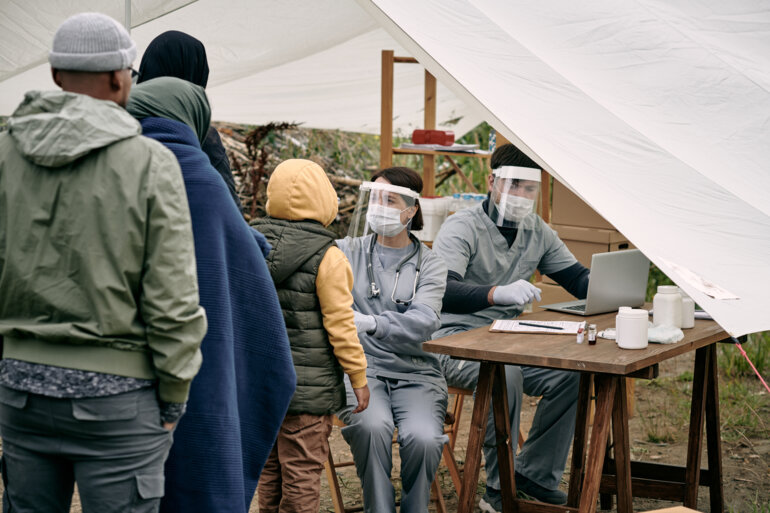Despite some share the concern of having their career plans delayed or disrupted by the pandemic, the new challenges emerged in these unprecedented times represent a unique opportunity to grow-up as oncology professionals and get ready to a new scenario where team working, humanisation of care and virtual education will be more crucial than ever.
While the number of COVID-19 infections are dramatically increasing globally, concerns about how the pandemic will hit training or career opportunities for young professionals are back on the table.
Although it is still not clear which scenario the pandemic is setting up for the future, results from two surveys conducted by the ESMO Resilience Task Force earlier this year highlighted that younger oncology professionals aged below 40 years were one of the groups at higher risk of distress among participants and that those worried for missing professional opportunities due to the pandemic were more likely to report feeling burnout.
How can young oncologists make the most out of the challenges posed by the pandemic? And, most importantly, is there a silver lining in temporary delayed or disrupted career plans?
The importance of teamwork
For Dr. Elli Sophia Tripodaki, Saint Savvas Hospital, Athens, Greece, there still is a silver lining despite the fact that she had to cut two well-deserved fellowships shorter to go back to her home country this past summer.
Having been awarded two fellowships – one from the Hellenic Society of Medical Oncology (HeSMO) in honor of Dr Evangelos Briasoulis, a brilliant oncologist who succumbed to cancer after his fight with the disease, and one from Women For Oncology-Hellas in female leadership - in January 2020 Tripodaki moved to London with her husband and four children where she was supposed to spend a 15 month training course at The Royal Marsden NHS Foundation Trust with the mentorship of Dr Susana Banerjee, Consultant Medical Oncologist and Research Lead for Gynaecological Cancers. However, two months later the pandemic outbreak made the situation change drastically.
“Things became quickly more challenging at the end of March when my whole family and I were sick with COVID” Tripodaki says. “It was quite frightening being in a foreign country with no relatives or a supporting network and not knowing the local healthcare system.” Once she recuperated, she went back to clinical activities which were, at that time, partially suppressed and reorganised following safety measures imposed by health authorities. Smart-working, virtual meetings and visits, finding a work-life balance were new aspects of the medical profession she rapidly got used to, with the support of the team and especially the nurses who were always extremely supportive. “It was quite a unique experience to witness such a global crisis and how professionals working together at such a large cancer centre got united, and special meetings and emergency planning were set up in order to mitigate the crisis effects,” continues Tripodaki. “Unfortunately, I had to cut my fellowship short, one reason being my husband, who is a cardiologist, was needed in Athens. But also, the uncertainty of the future affected the decision. My beloved grandfather passed away due to COVID in Boston and I had to say goodbye through FaceTime; it was one of the most difficult things I have ever had to do and made me feel the need to be close to my family in these uncertain times.”
Questioned about the consequences of disrupted educational opportunities, Elli prefers to focus on the lessons learnt during these difficult times. “Obviously, from the oncology point of view per se, my learning experience was cut short, and I wished the situation was different and I could of stayed longer,” she comments. “My experience though at the Royal Marsden in the middle of this global crisis was unforgettable and taught me a many lessons not only in oncology but also in life that I will never forget. It made me all the more aware of the global medical community and the need for ongoing International collaborations in order to optimize patient care. In addition, witnessing a female leader oncologist and mother and how she strived to find a work-home balance in these stressful times was a lesson in itself. I am extremely grateful to HESMO for this very unique opportunity and to the Royal Marsden and especially to Dr Banerjee for making it all possible”.
The value of humanisation in cancer care
Also Dr. Ana Cardena, Hospital Universitario Fundación Alcorcón, Alcorcon, Spain, believes that all this suffering she faced during the first peak of the pandemic did not come for nothing. “During the pandemic we have lost a lot in terms of humanisation, and we need now to bring hope back to our units while the second wave of infections is already a reality.”
Virtual learning supports oncologists in remote areas
The pandemic outbreak has also led the way for new virtual opportunities in clinics and research. In addition to an increasing amount of telemedicine services observed in oncology in the recent period, virtual platforms for meetings are ensuring continuity of learning, also making education more accessible to many oncologists, especially those living in low and middle-income countries, as Dr. Eileen Yi Ling Poon, NCCS - National Cancer Centre Singapore, Singapore, highlights.







